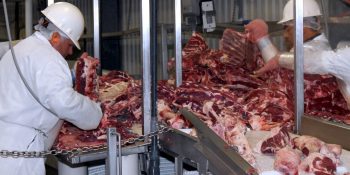
SPREAD THE NEWS
COMMENT, Like, Follow & SHARE @I70Scout
CURRENT EDITION
WEATHER & TRAFFIC PUZZLES RECENT NEWS ADVERTISE WITH US


Image provided by MGN on-line. please note this image was NOT taken during the COVID-19 pandemic.
Denver — Today, Colorado U.S. Senator Michael Bennet sent a letter to the United States Department of Agriculture (USDA) Inspector General Phyllis Fong and the United States Department of Labor (DOL) Acting Inspector General Larry Turner requesting an investigation into federal actions that may have contributed to the spread of the Coronavirus Disease 2019 (COVID-19) in meat processing facilities and other agricultural processing facilities.
Specifically, Bennet requested Fong and Turner review steps the federal government took to prevent the spread of COVID-19 in meat processing facilities and how President Donald Trump’s use of the Defense Production Act to keep these facilities open may have affected the health of workers.
“Meat processing plants have had some of the highest rates of COVID-19 infections, harming a workforce predominately comprised of immigrants, refugees, and People of Color who are at a higher risk for COVID-19…While many industries suffered from COVID-19 outbreaks, the high incidence of outbreaks at these facilities, even very early in the pandemic, raises questions,” wrote Bennet. “In Weld County, Colorado, there were reports of increased doctors’ visits among meat processing plant employees throughout March, with dozens of confirmed cases, 14 hospitalizations, and at least two worker deaths by April 10…By May 5, hundreds of United States Department of Agriculture (USDA) Food Safety and Inspection Service (FSIS) employees had been exposed to or tested positive for COVID-19, and three individuals had died.”
In the letter, Bennet specifically requested Fong and Turner review:
Bennet has continuously voiced his concern regarding the safety of workers at meat processing facilities and other agricultural processing facilities during the pandemic. In April, Bennet sent a letter urging Vice President Mike Pence and other members of the Trump Administration to help ensure the safety of the nation’s food supply and to protect essential workers in the food supply chain during the pandemic. In May, Bennet sent a letter to Pence requesting an update on the delivery of promised testing and PPE to protect workers at the JBS meatpacking plant in Greeley. In the letter, he highlighted the importance of testing to protect the workers, their families, and the surrounding communities and safeguard our nation’s food supply. Later that same month, Bennet and his colleagues raised concerns about the Trump Administration’s Executive Order that pressured meat processing facilities to open without verifying the necessary safety measures to protect workers and the food supply. In June, Bennet joined UFCW Local 7 in Greeley to honor the hardworking UFCW Local 7 members who lost their lives while serving on the front lines of the pandemic.
The text of the letter is available HERE and below.

DENVER – Gov. Polis today provided an update on Colorado’s response to the COVID-19 pandemic.
“Colorado is in a better place than some of our neighboring states but we can’t let up when it comes to social distancing, mask-wearing, and washing our hands to slow the spread of the virus,” said Governor Jared Polis. “It’s up to each and every one of us to make sure we are taking the steps to protect ourselves, our loved ones and our community during this pandemic. While it is welcomed news that cases are not increasing, we need to have the resolve to keep it up to have them start decreasing.”
As a result of the mask-wearing order and the decision to close bars, Colorado is seeing COVID-19 cases plateau, but the Governor cautioned Coloradans that the state is in a precarious position and everyone must remain vigilant and continue following social distancing requirements, wearing masks, and washing hands.
Last week, the Attorney General’s office issued a cease-and-desist letter to Live Entertainment, the company responsible for these large-scale events in Weld County. The Attorney General’s office has proactively sent cease and desist orders to the organizers and promoters, Adixion Music, as well as the venue, Imperial Horse Racing Facility in Pierce, to stop these illegal events. The Governor discouraged Coloradans from purchasing tickets or attending these types of events because it is better for the community and noted that ticket holders may end up being scammed out of their money when these events are shut down.
The Governor announced that starting Thursday, August 6, the Colorado COVID Relief Fund will begin accepting applications for the sixth round of funding. Organizations must apply by Aug. 20 at 7:00 p.m. Eligible community-based organizations across Colorado may apply for a general operating grant of up to $25,000. New to this deadline, the Fund will also accept applications from collaborative efforts that include three or more organizations to encourage community and regional coordination. All information will be updated on www.helpcoloradonow.org on Wednesday, August 5, and Coloradans can also email . To date, the fund has raised more than $22 million and distributed $16.4 million to more than 750 organizations serving Coloradans in all 64 counties.
Governor Polis was excited to announce that after speaking with Vice President Pence over the weekend, the National Guard’s deployment has been extended until the end of the year. The Governor thanked the National Guard men and women for all their hard work to help Colorado respond to the coronavirus pandemic. Last week, the Colorado National Guard reached a testing milestone in support of the State’s ongoing COVID-19 testing across Colorado, testing 20,000 Coloradans at 122 testing sites in 28 counties and 34 cities.
Governor Polis also extended an Executive Order today declaring a state of disaster emergency and providing additional funds for the pandemic response.

The Colorado Department of Human Services (CDHS), in collaboration with the Colorado Department of Education (CDE), is pleased to announce that Coloradans with school-enrolled children will begin to receive food benefits through the Pandemic Electronic Benefit Transfer (P-EBT) program starting Wednesday, July 22. This effort will help support Colorado’s families during the COVID-19 pandemic.
More than 360,000 Colorado children are eligible for P-EBT benefits, which will reimburse families for the free and reduced-price meals that students missed while schools were closed in March, April and May because of COVID-19.
Families who participate in the Supplemental Nutrition Assistance Program (also known as SNAP, or food stamps), and whose children attend a school that participates in the National School Lunch Program, can expect to have benefits automatically loaded onto their EBT cards between July 22 and July 31. Eligible families who don’t receive an automatic payment will need to apply for P-EBT funds.
“We know many Colorado families are struggling to pay bills and feed their children, and this is one way we can help provide access to nutritious food and meet the needs of Coloradans during this difficult time,” said CDHS Food and Energy Assistance Director Karla Maraccini. “When used in conjunction with grab-and-go meals, these P-EBT benefits will be a great tool in ensuring Colorado’s children receive healthy meals.”
The P-EBT program is designed to reimburse households for meals missed during school closures for those who are enrolled in or eligible for the Free and Reduced Price Lunch Program (FRLP). Benefits are calculated in the amount of $5.70 per student per day of school closure. Households with students who are already enrolled in FRLP will receive a lump sum of $279 per eligible child (49 days of closure at $5.70 a day). A child newly eligible but not previously enrolled will receive the appropriate amount for the days they are determined eligible for P-EBT.
Eligible families include those with children in preschool, Early Childhood Education (ECE) and pre-K through grade 12 who are enrolled in a school that participates in the NSLP. This includes public, private and charter schools. Students who attend some online schools are also eligible, as are special needs students aged 18 to 22.
Some families may need to apply for P-EBT benefits, and the application will be made available in the last week of July on the CDHS website. Those instances can include: • If families do not automatically receive P-EBT funds on their current EBT card or if they did not get SNAP for all three months (March, April and May), they may qualify for more P-EBT benefits and should apply.
Eligible students who were not receiving food assistance in March, April and May will need to apply for the P-EBT benefit.
If families can’t find or don’t have their EBT card, they will need to submit an application and then request a new card at . In this email, they will need to include the applicant’s name, date of birth, mailing address, phone number, State Issued ID Number, and P-EBT application reference number. All applicants will need their student’s State Issued ID number (also referred to as a SASID), which should have been provided to them by their school or school district (school contact information can be found here).
In addition to supporting healthy and wholesome meals for Colorado’s eligible school-age children, P-EBT is expected to bring more than $110 million of federal money into the state’s economy through food retailers.
P-EBT was created under the Families First Coronavirus Response Act (H.R. 6201) as an important opportunity to provide nutritional resources to families who are losing or lost access to free or reduced-priced school meals as schools across Colorado closed in response to COVID-19.
More information can be found at www.colorado.gov/cdhs/p-ebt.
Image Credit: MGN Online

How far apart should the trumpet section be from the trombone section at my first band rehearsal during COVID-19?
How many singers can rehearse together or perform on my school’s stage?
Can dancers resume their rehearsals and performances? Can actors rehearse and perform scenes with other actors? Should I cancel my group’s performance schedule, or wait and see?
These are questions that are on the minds of thousands of band leaders, choir directors, acting coaches, dance instructors, performers and countless others connected to the performing arts. And a unique team at Colorado State University is searching for those answers.
Led by John Volckens, a professor of mechanical engineering in the Walter Scott, Jr. College of Engineering, and Dan Goble, director of the School of Music, Theater, and Dance, the team is launching a study – Reducing Bioaerosol Emissions and Exposures in the Performing Arts: A Scientific Roadmap for a Safer Return from COVID19.
Researchers will aim to determine how far airborne particles and droplets are projected by those playing wind and brass instruments, singers, actors and dancers, and whether steps can be taken to protect both performers and audience members from the risks of co-exposure to COVID19.
Interdisciplinary approach
The team, which includes Rebecca Phillips, CSU’s director of bands in the College of Liberal Arts; Charles Henry, chemistry professor in the College of Natural Sciences; and Dr. Heather Pidcoke, the university’s chief medical research officer, hopes to collect and analyze data starting in early to mid-July. The multidisciplinary team also includes experts in environmental health, Kristen Fedak and Nick Good, from the College of Veterinary Medicine and Biomedical Sciences, and engineers Christian L’Orange, John Mehaffy and Jacob Fontenot. They hope to be able to recommend best practices for those in the performing arts in a timely manner.
“What we know is this issue is being looked at by a lot of people around the world, but there appears to be very little actual scientific study going on,” Goble said. “Colorado State is a Tier 1 research institution, and we also have a highly regarded performing arts school. It makes sense that a scientific study be launched here because we have the people and facilities to do it well.”
Goble said he has been getting questions from school music teachers around the country about how to proceed once classes resume in the fall. Those same questions have been keeping him up at night as he tries to negotiate the uncharted waters created by the pandemic.
“Over the centuries, performers have always found a way to adapt, to keep their art forms viable, even in the worst of times,” he said. “This is different. COVID-19 has not only shut down school programs, it has halted groups like the Larimer Chorale and the Colorado Symphony. The Metropolitan Opera had to shut down until at least 2021, and Broadway has gone dark. Everyone is looking for a path forward.
“This really was one of those ‘why not us?’ moments,” Goble continued. “This is something we can and should do.”
Measuring aerosol emissions
The key scientific piece of the project is a human exposure facility, built by a team of mechanical engineering undergraduate students as part of their senior capstone project. This unique facility, at CSU’s Powerhouse Energy Campus, can be used to measure human aerosol emissions and exposures in a clean, versatile environment. Only a handful of the chambers exist, and Volckens and his team use a custom-built computer control and data acquisition system to track human release of aerosols of varying size, concentration and chemical composition.
Volckens hopes to recruit up to 100 volunteers to participate in the study. Each participant will do some singing, and he is seeking brass and woodwind multi-instrumentsalists. Subjects will wear a variety of face coverings, including cloth and N-95 masks, to determine best practices for singers, actors and dancers.
“This is a great example of what a top research university can do, and a great example of colleagues from across campus working together to solve a challenging and serious problem,” Volckens said. “Our goal is to develop actionable information that allows people in the performing arts to get back to what they love to do.”
Goble said similar studies have been launched at the University of Colorado and the University of Maryland.
“John (Volckens) is well connected with the researchers at CU, so our research will be collaborative,” he said. “The bottom line is that the more people who are working on this, the better. The quicker we can come to some conclusions, the better. It will take some time to reach conclusions, and this is something we want to get right. There are a lot of people depending on us.”
Funding needed
Testing is tentatively set to begin when study procedures are approved by internal and external experts, and when modifications to equipment are complete.
In the meantime, Volckens and Goble are seeking funding to ensure the project’s success. To date, several organizations/companies have combined to provide about half of the needed financial backing to pay for research supplies, salary for project staff (one graduate student, one post-doc, one research scientist), calibration and maintenance of equipment and open access publication fees to make sure the study results are freely accessible.
Supporters include the American Bandmasters Association Foundation; American Choral Directors Association; Auburn University; Big Ten Band Directors Foundation; CSU School of Music, Theatre and Dance; Conn-Selmer; Mill City Church; National Band Association; Texas A&M University Bands; Wegner Corp.; Women Band Directors International Foundation, and Yamaha Corp.
To learn more about the study and how to lend your support, visit: https://smtd.colostate.edu/reducing-bioaerosol-emissions-and-exposures-in-the-performing-arts/

Recognizing the impact the COVID-19 crisis has had on small and medium-size businesses, the Arapahoe County CARES Program is launching Advance Arapahoe, a $6 million grant program that will provide support and retain jobs at businesses throughout the County.
“This is one of the first grant programs we’re launching through the Arapahoe County CARES Program, and it will provide crucial relief to businesses most affected by the COVID-19 shutdowns,” said Arapahoe County Board Chair Nancy Sharpe. “These small and medium-size businesses are essential to our economy, and Arapahoe Advance is a step toward providing some stability through this transition to reopening.”
Advance Arapahoe’s first priority will be to fund employers within the boundaries of unincorporated Arapahoe County, as most businesses within incorporated communities can apply to relief programs through their jurisdiction. Award preference also will be given for employers who commit to retain and/or bring back employees with these funds
Funds are available in two grant categories:
Grants in both categories will be up to $20,000, depending on the size of the company. Qualifying businesses must have operated a physical location in Arapahoe County since at least June 1, 2019, have 500 or fewer employees, be in good standing with regulatory agencies, meet minimum financial requirements and retain at least one job (that meets low- to moderate-income requirements) as a result of this assistance.
Applications for this program will open on June 22, 2020. The streamlined application process is designed to be quick and easy, with applications due by July 3, 2020, or until the funds have been depleted.
Advance Arapahoe is part of Arapahoe CARES, the federally funded relief program that awarded $114.5 million to the County under the Coronavirus Aid, Relief, and Economic Security (CARES) Act.
Complete eligibility information for Advance Arapahoe is available here. For more information about the many programs Arapahoe CARES is launching, visit our website.

DENVER – Gov. Polis today provided an update on the state’s response to COVID-19 and highlighted the importance of staying home. The Governor was joined remotely by Lt. Governor Dianne Primavera, who like many Coloradans has been working remotely during the pandemic.
“Coloradans must remember that we are not out of the woods yet and this pandemic is still very much with us in our communities. If we want to continue moving forward, we have to remain vigilant, and continue staying home as much as possible or in our great outdoors, and follow social distancing requirements like wearing masks and washing our hands,” said Governor Jared Polis. “I will continue working with the legislature on building a resilient response, from a health perspective and economic perspective, for Colorado in the face of this pandemic. We’re all in this together, and the way we’re going to get through it is by doing right by one another.”
“I know this is a difficult time for so many Coloradans, but it’s critical that we all continue taking the necessary precautions like wearing masks when leaving the house, washing our hands, and staying home as much as we can,” said Lieutenant Governor Dianne Primavera. “As a four-time cancer survivor and someone who is over 60, I fall into two risk categories and have been working remotely during the pandemic. Though I feel as strong and healthy as ever, I want to do everything I can to protect my family,myself and my community. It hasn’t been easy, and I know many others are going through something similar. We can cope by getting outdoors to exercise or doing Zoom calls with the grandkids. We also must remember that we are all together in this.”
The Governor also provided an update on the legislative session and thanked the Joint Budget Committee for their work on the state budget. Gov. Polis is focused on working with the legislature on building a resilient response, from a health and economic perspective, for Colorado in the face of the pandemic. This includes focusing on lowering health care costs and supporting businesses and workers who are struggling. The Governor expressed support for the legislature’s work around creating a loan relief fund, bolstering the state’s unemployment insurance program, and a more permanent sick leave policy. Gov. Polis also praised state lawmakers for being in the process of taking swift action in response to the hundreds of thousands or millions of Americans that are demonstrating against police abuse and structural racism.
Gov. Polis highlighted two organizations who are working with Coloradans impacted by the COVID-19 pandemic and have received grants from the Colorado COVID Relief Fund for their work.
The Governor highlighted GrowHaus, which serves as a source of fresh food in the Elyria-Swansea and Globeville neighborhoods of Denver, where there are few traditional grocery stores within walking distance for many residents. When COVID hit, GrowHaus received a massive increase in households looking for services. So they mobilized their entire team to start packing and delivering emergency food packages including dry goods, fresh fruit and vegetables for households in need across the area at no charge. Due to the help they’ve received from the COVID-19 Relief fund, they’re currently serving 2,500 Coloradans, and partnering with other local organizations like Bondadosa, Denver Food Rescue, and We Don’t Waste.
The Governor highlighted the River Valley Family Health Center, which is serving thousands of families in Delta, Montrose, and Olathe with high-quality, affordable health care. In response to the pandemic, they’ve stepped up IT support for telehealth to help slow the spread of the virus. They’ve also strengthened their routers because they know that not everyone has access to WiFi at home. Patients can now come to the parking lot and have a remote session if they don’t want to risk physically interacting with a doctor. They also offer testing for COVID-19 and ensure that everyone who gets tested gets follow-up behavioral health outreach.
To learn more about the Colorado COVID Relief Fund, visit www.helpcoloradonow.org.
Gov. Polis signed Executive Order D 2020 094, amending and extending prior Executive Orders suspending certain regulatory statutes concerning juvenile justice, regional centers, and behavioral health due to COVID-19.

DENVER (AP) _ Restaurants in Colorado can re-open at reduced capacity this week and day camps will be allowed to open next week, Gov. Jared Polis announced Monday.
Restaurants in spots like El Paso and Routt counties have already been allowed to re-open under special approvals by state health officials. Restaurants elsewhere in Colorado will be able open starting Wednesday at 50 percent of their posted occupancy limit but cannot have more than 50 customers at a time, Polis said.
“Diners will have more space between tables and at many restaurants, more opportunities to eat outside. The safest thing anyone can do is stay home whenever possible, but for those who want to shop and dine we want to make sure it can be done as safely as possible,” he said.
Polis said children’s day camps and youth sports camps will be able to open on June 1 but residential overnight camps would be closed through June.
For most people, the coronavirus causes mild or moderate symptoms, such as fever and cough that clear up in two to three weeks. For some, especially older adults and people with existing health problems, it can cause more severe illness, including pneumonia and death. The vast majority of people recover.

DENVER (AP) — Gov. Jared Polis and state health officials on May 20 urged residents to celebrate the Memorial Day weekend responsibly by sticking to existing social distancing restrictions, wearing masks and staying in groups of 10 or fewer people to fight the coronavirus pandemic.
“This isn’t exactly a normal Memorial Day weekend. It’s a Memorial Day weekend in the middle of a worldwide pandemic,” Polis said. “It’s not the time for big family reunions and massive cookouts and celebrations’’ but about “solemnly honoring the fallen.”
Colorado has reopened campgrounds and transitioned from a stay-at-home to “safer-at-home’’ directive that has eased restrictions on retail businesses while urging residents to limit travel. It has flattened the growth curve of the virus and guaranteed there are enough intensive care beds at hospitals to treat the sick.
But that progress can easily be undone, said Jill Hunsaker Ryan, executive director of the Department of Public Health and Environment.
Colorado, Ryan said, is “a victim of our own success’’ in flattening that curve. “But we are not out of the woods,’’ she said. “The disease can easily get away from us.’’
Ryan and other top health officials said Colorado’s top priorities include keeping those hospital beds open, getting students back to school in the fall, and preventing a second wave of the coronavirus during the November-to-March flu season.
The state has allowed 14 counties to adopt more liberal restrictions than state standards and is considering more requests, Ryan said. The Colorado School of Public Health estimates nearly 3% of the state’s population has had the virus, she added.
More than 1,200 people in Colorado have died because of the virus or while having it, and more than 22,000 have tested positive, the state says.
For most people, the coronavirus causes mild or moderate symptoms, such as fever and cough that clear up in two to three weeks. For some, especially older adults and people with existing health problems, it can cause more severe illness, including pneumonia, and death.
Meanwhile, the Weld County sheriff’s office announced plans Tuesday to distance 89 inmates deemed vulnerable to COVID-19 from other inmates in the county jail following orders to do so from a federal judge.
Judge Philip Brimmer ruled earlier this month that Sheriff Steve Reams failed to take adequate measures to protect inmates and violated their Eighth Amendment rights against cruel and unusual punishment, the Greeley Tribune reported.
The ruling was in response to a lawsuit filed by the American Civil Liberties Union of Colorado on behalf of seven inmates who said they were susceptible to being infected with the coronavirus.
Medical staff screened inmates on May 13 and determined 89 were vulnerable, according to U.S. Centers for Disease Control and Prevention guidelines.
Since the court ruling, the sheriff’s office has distanced newly admitted vulnerable inmates and vulnerable inmates already at the jail, enhanced sanitation measures, provided facial coverings and increased monitoring.

DENVER – With the warm weather and upcoming holiday weekend, Colorado Parks and Wildlife reminds all state park visitors that designated swim and beach areas remain closed at Colorado’s state parks to protect public health due to COVID-19.
It is important that everyone respect all posted seasonal, wildlife and COVID-19 related closures, and do their part to provide a safe and enjoyable outdoor experience. Additional areas that discourage social distancing including group picnic areas, group camping, showers and laundry facilities remain closed until further notice per Governor Polis’s Safer at Home order.
Agency officials encourage all park visitors to follow outdoor recreation best practices and recommendations provided by the Colorado Department of Public Health and Environment to help prevent the community spread of COVID-19.
Until further notice designated swim and beach areas, including those that often open for the season on Memorial Day weekend, remain closed to public use at the following state parks: • Boyd Lake State Park
Park managers have the discretion to close any areas that become unsafe, which may include overcrowding. Agency officials are monitoring park visitation capacities to reduce overcrowding so people can visit parks responsibly and safely.
“We want people to get out and enjoy the outdoors, but to also do so safely,” said Northeast Region Manager Mark Leslie. “We hope people enjoy and celebrate the holiday responsibly, following public health orders and leave no trace principles.”
CPW remains committed to providing outdoor recreation activities to Coloradans while also ensuring public safety guidelines are met. Visit the CPW website to discover outdoor activities that allow for safe social distancing from others. Learn more about outdoor recreation opportunities across Colorado during COVID-19.